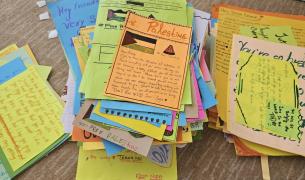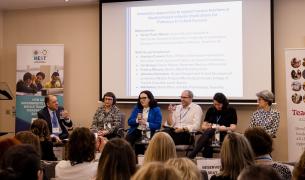Update on Teach For Palestine’s progress and our network’s response to the humanitarian crisis in Palestine

Read this post in Arabic
Editor’s Note: Many across our network have asked how our network is responding to the humanitarian crisis in Palestine and this news post is an effort to begin to address these questions. This news story doesn’t address the trauma happening on all sides of this deep-rooted crisis but rather aims to be responsive to the questions about what’s happening in Palestine where our newest partner has recently launched and where children are disproportionately bearing the impact of the violence.
The Israeli attacks on Gaza since October 2023—which have come in the wake of the October 7 attacks by Hamas on Israel that killed approximately 1200 people and took 253 hostage, of whom at least 98 are still being held captive and 30 are assumed dead—have turned what was already a decades-long crisis and occupation into a catastrophic humanitarian disaster for Palestinian children.
In the last six months, around 14,500 Palestinian children in Gaza have been killed, 17,000 have been orphaned, unaccompanied or separated from their parents, and many more are suffering from life-changing injuries, starvation, constant fear of bombing, and psychological trauma, with more than a million children in need of mental health and psycho-social support.
Throughout these extremely challenging circumstances, our network partner Teach For Palestine has continued to pursue its vision for all Palestinian children to receive a high-quality, inclusive education in a safe and nurturing environment. Teach For All is working to support Teach For Palestine including through our Education in Emergencies initiative, and our network is advocating for peace and justice.
Teach For Palestine's Progress
Teach For Palestine launched its organization and joined the network in late 2023. Headquartered in Ramallah, it launched training in April 2024 for its cohort of 22 beginning teachers who will be teaching in grades 1-4 in government schools in the West Bank—in Ramallah, Birzeit, Salfit, Jericho, and Jerusalem suburbs. The organization is currently recruiting a second cohort of 24 recent graduates with diverse academic backgrounds from Palestinian universities to be placed in the coming academic year in high-need non-governmental schools in the West Bank. Teach For Palestine will contribute to expanding educational opportunities for children in the West Bank where Israeli attacks also increased over the past six months. Save the Children notes that “restrictions on movement and access, home demolitions and forced displacement have a significant impact on children’s lives,” and that “challenges to life, security, and human dignity are realities for children living in highly vulnerable areas.”
In the future, Teach For Palestine hopes to support the rebuilding of Gaza’s decimated education system. Even before the current conflict, students in Palestine were severely disadvantaged, including by the long-term effects of the 17-year blockade of Gaza on children’s wellbeing which were widely reported. A 2022 Save the Children study found that 84% of children reported feeling fearful, 59% of parents said that their children had self-harmed, and 55% said their children had had suicidal thoughts.
The ongoing emergency context of Palestine has put trauma-sensitive classroom approaches and student, teacher, and staff wellbeing at the center of Teach For Palestine’s training and support program, as it aims to enhance the quality of both physical and learning environments in Palestinian schools, with a particular focus on institutions in the most marginalized communities.
Teach For All's Education in Emergencies support
Teach For All has been working closely with Teach For Palestine to support its successful launch in this incredibly challenging context of war and escalating violence, including by providing Arabic-language resources on teacher wellbeing, student psychosocial support, remote learning strategies, working with parents, and social-emotional learning activities.
For our network, we have held connection spaces for any network teachers and alumni impacted directly or indirectly by what is happening in Gaza, providing an opportunity to collectively process the devastation, as well as to share strategies they're using for themselves and their students, and how they're taking action. More broadly, within our Education in Emergencies Initiative, we recently launched eight new teacher training modules, including topics such as centering equity in crises; the role of teachers in emergencies; trauma-sensitive teaching; teaching multi-grade classes; and teacher wellbeing.
Support from the network
Across our network and global organization, many have expressed their desire for peace and a just and lasting solution. For example, Teach For Qatar hosted a space with its fellows, students, and staff on Qatar National Day with a gathering focused on standing in solidarity with Gaza. They created poetry, wrote messages of support, and created space to process with one another and share hopes for a better future. Teach For Qatar staff have also been visiting injured and orphaned Palestinians from Gaza who are in Qatar receiving medical treatment. Teach For India hosted a space for members of its community in partnership with our Middle East and North Africa (MENA) regional team and our Head of Education in Emergencies to learn more about the lived reality of children and educators in Palestine and thought-partner on how we can collectively support and take action. Teach For India also recently organized a Peace Carnival to facilitate virtual dialogues among students in India and peers from our partner organizations in Afghanistan, Armenia, Palestine, and Ukraine to discuss the role each of us can play in building a more peaceful world. They shared over 500 letters of love from the Teach For India community. Other expressions and offers of support for those impacted by the crisis have come from many other staff members, teachers, students, and alumni.
On World Children’s Day, 14-year old Dana, who is a Palestinian student of Teach For Qatar and a participant in Teach For All’s Student Voice Accelerator, contributed this powerful blog post. “Many of us complain if our room isn’t big enough or if our bed doesn’t fit all our stuffed animals,” she wrote. “Meanwhile, there are humans like you and me who are forced to live, sleep, and eat on the streets because of the illegal stealing of houses, or the constant bombing in war zones that leave everywhere completely turned on its head.”
Learn more and an opportunity to support
To learn more about Teach For Palestine’s work, please visit their website and follow them on Facebook, Instagram, LinkedIn, X (Twitter), and YouTube, or reach out to Teach For All’s Head of MENA region, Reem Marto.
Teach For Palestine also recommends that those who would like to offer financial assistance to support Palestinians impacted by the humanitarian emergency donate to Taawon, one of the largest locally led NGOs operating in Palestine and the diaspora camps in Lebanon. Taawon reaches more than one million Palestinians annually and is running a campaign to raise funds for orphaned children from Gaza and for the delivery of aid to displaced people in Gaza.
Learn more about our Education in Emergencies Initiative and sign up for our EiE newsletter


